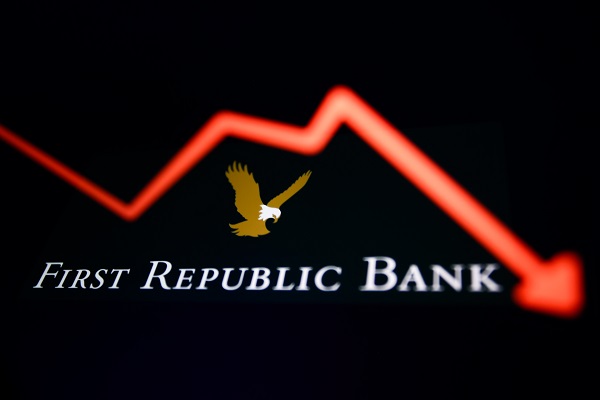Must read: First Republic Bank crash, housebuilders, GSK, Reckitt, Persimmon
26th April 2023 09:31
by Victoria Scholar from interactive investor
Our head of investment rounds up the morning's big news.

GLOBAL MARKETS
European markets have opened in the red. While the FTSE 100 is under pressure, it is outperforming indices on the continent which are nursing heavier losses, with the DAX, CAC, and FTSE MIB all down more than 1%.
UK housebuilders are stemming steeper declines for the UK blue-chip index, with Persimmon (LSE:PSN) leading the FTSE 100 after an improved trading update versus its previous release in March.
- Invest with ii: Open a Stocks & Shares ISA | ISA Investment Ideas | Transfer a Stocks & Shares ISA
Wall Street closed lower with the Nasdaq shedding almost 2% and the Russell 2000 down 2.4%. Concerns about the health of the banking sector have resurfaced following First Republic Bank (NYSE:FRC)’s 50% plunge on Tuesday after it reported $100 billion of withdrawals, prompting fears of another mid-cap bank failure stateside.
Tech earnings are in focus, with Microsoft Corp (NASDAQ:MSFT) and Alphabet Inc Class A (NASDAQ:GOOGL) shares rallying after-hours following better than expected first quarter results, albeit from lowered expectations, lifting other stocks in the sector like Amazon.com Inc (NASDAQ:AMZN) ahead of its results after the bell.
GSK
GSK (LSE:GSK) reported first-quarter adjusted profit of 37p per share, beating analysts’ expectations for 33.2p, while revenue hit £7 billion also topped estimates for £6.5 billion. The pharma giant confirmed its 2023 full-year guidance for sales and earnings, while its shingles vaccine drug Shingrix enjoyed sales of £833 million, beating consensus forecasts.
Many investors have been shifting towards defensive sectors like pharmaceuticals this year amid the sluggish economic backdrop, providing a tailwind for stocks like GSK which is up over 7% in the past six months. However, it is still underperforming the FTSE 100 which is up by more than 11% reflecting investor concerns about the strength of GSK’s drug pipeline. GSK has been pursuing inorganic growth instead, most recently with its acquisition of Bellus Health for $2 billion which offers respiratory drugs.
RECKITT
Reckitt Benckiser Group (LSE:RKT) reported like-for-like first-quarter net revenue up 7.9%, more than double expectations for 3.6% and now expects 3-5% full-year net revenue growth.
Like many businesses, the consumer goods giant behind brands like Nurofen and Strepsils has been raising prices to offset the pressures of inflation and preserve profit margins. Demand appears to be holding up despite the consumer slowdown and the risk that individuals switch to unbranded cheaper supermarket alternatives to combat the squeeze on household budgets.
Meanwhile, there is change taking place at the top for Reckitt, with Kris Licht taking over as CEO of Reckitt Benckiser by the end of the year, replacing Nicandro Durante. Laxman Narasimhan unexpectedly stepped down last September after three years at the helm, shaking its share price amid the C-suit uncertainty. Investors will be relieved that a new boss has been appointed, who has been with the firm since 2019 and is seen as a continuity candidate, unlikely to spearhead any immediate drastic changes at the group.”
PERSIMMON
Persimmon is trading at the top of the FTSE 100 after its forward sales position picked up to £1.7 billion versus £1 billion on 31st December. The housebuilder said that if this continues, full-year volumes will come in towards the upper end of its guided range of 8,000-9,000 completions.
Persimmon said trading in recent weeks has offered some signs of encouragement and the long-term demand fundaments for new homes remain robust. However, it warned that build cost inflation remains at around 8%-9% with limited signs of short-term easing.
Last month, Persimmon said it expects to build 40% fewer homes in fiscal 2023 and slashed its dividend by 75%, sending shares sharply the red.
Today’s update is considerably more positive than its previous announcement in March. A pickup in sales and an improved outlook for volumes is helping to drive shares higher today. However, inflationary headwinds linger with Persimmon’s cost pressures remaining sky high.
With the Bank of England approaching the peak of its rate hiking cycle, housebuilders enjoyed a strong start to the year amid hopes that pressure from expensive borrowing rates would start to ease, providing some let up for the housebuilders. However, Persimmon’s mega dividend cut and dismal outlook at the start of March erased those initial gains, with shares now trading flat year-to-date as the stock attempts to regain ground in recent weeks.
These articles are provided for information purposes only. Occasionally, an opinion about whether to buy or sell a specific investment may be provided by third parties. The content is not intended to be a personal recommendation to buy or sell any financial instrument or product, or to adopt any investment strategy as it is not provided based on an assessment of your investing knowledge and experience, your financial situation or your investment objectives. The value of your investments, and the income derived from them, may go down as well as up. You may not get back all the money that you invest. The investments referred to in this article may not be suitable for all investors, and if in doubt, an investor should seek advice from a qualified investment adviser.
Full performance can be found on the company or index summary page on the interactive investor website. Simply click on the company's or index name highlighted in the article.